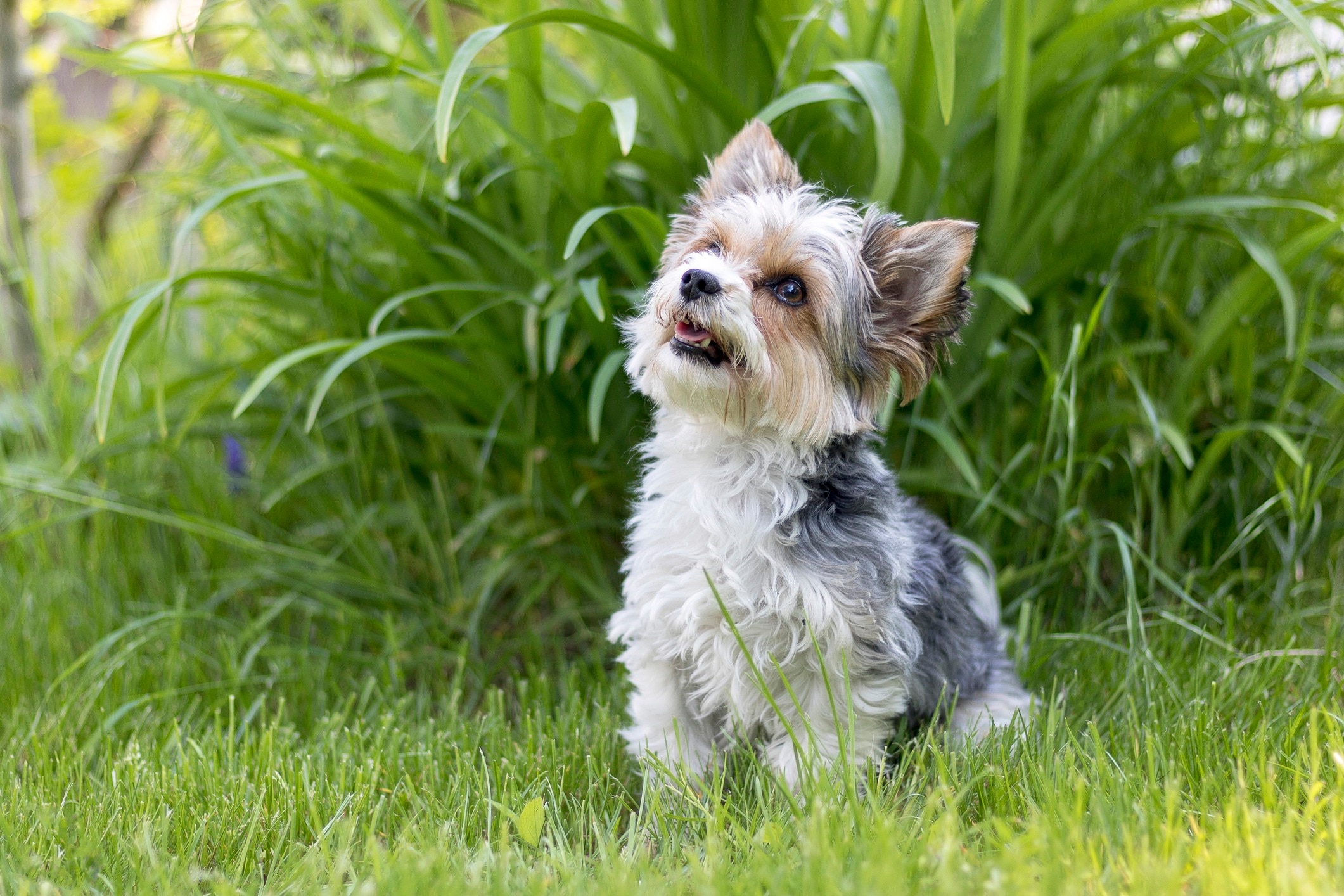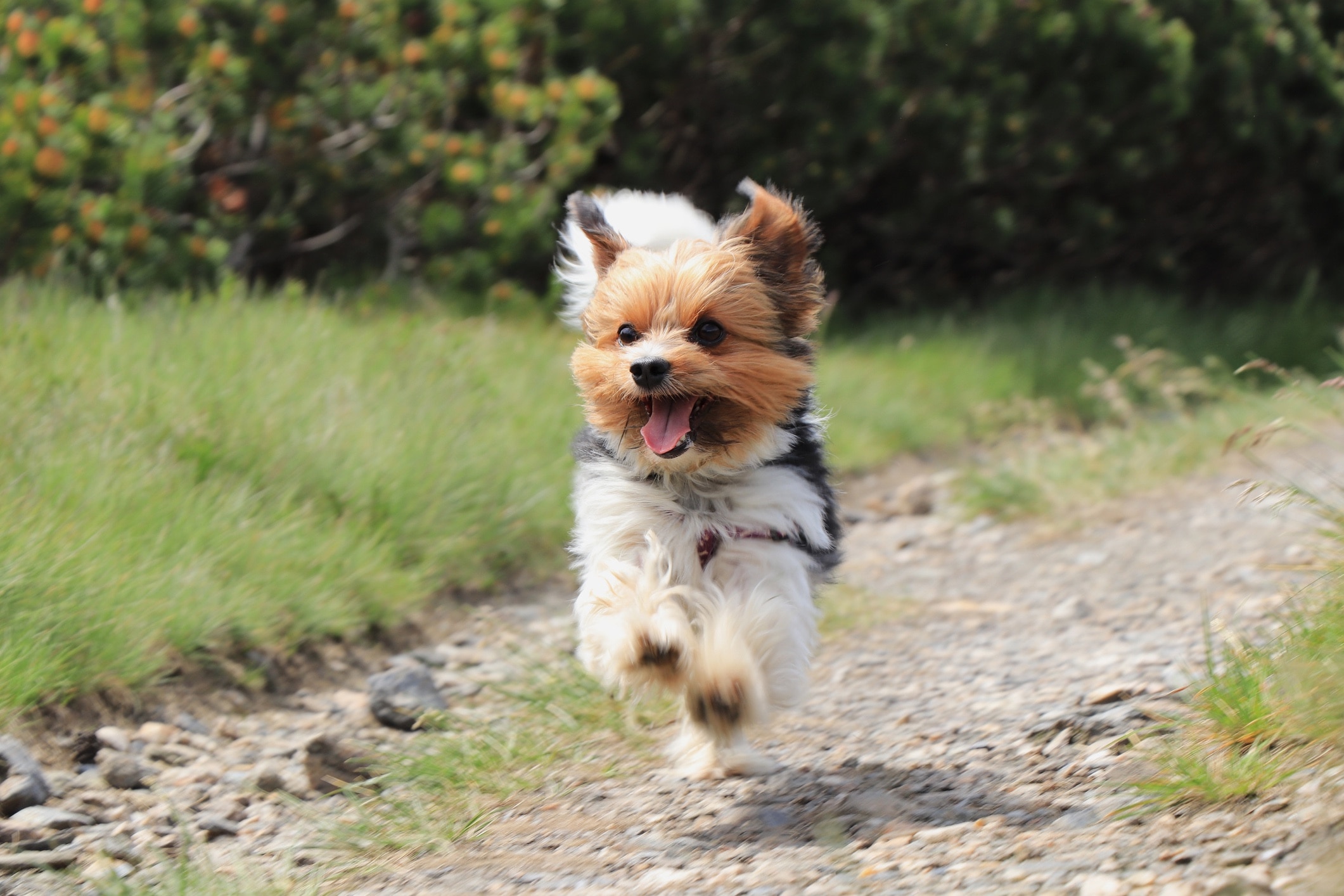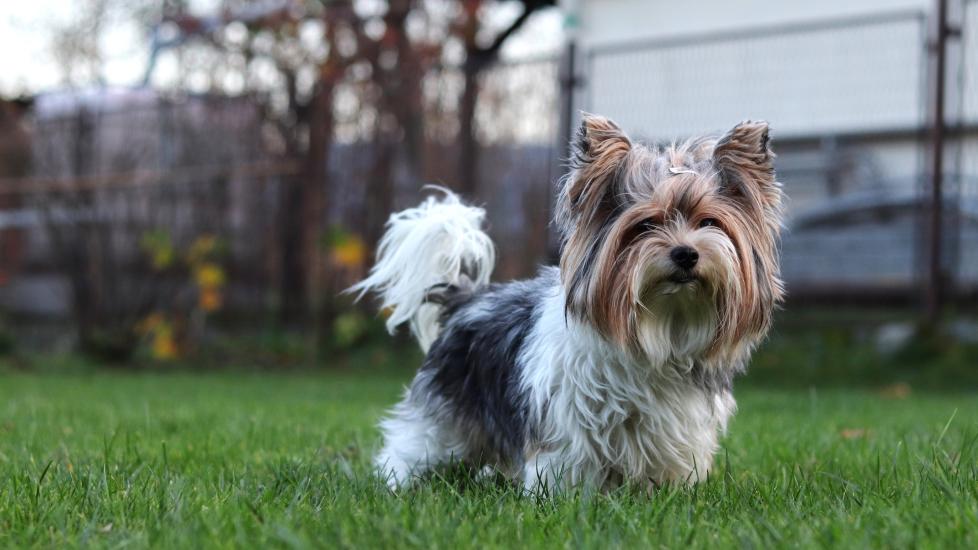Biewer Terrier
Biewer Terriers are a relatively recent addition to the world of dog breeds. The Biewer, pronounced beaver, can be traced to 1984 Germany, where two tricolor puppies were born in the kennel of experienced Yorkshire Terrier breeders Werner and Gertrude Biewer, according to the Biewer Terrier Club of America (BTCA). The American Kennel Club (AKC) officially recognized the Biewer Terrier in 2021.
This is a small breed: Full-grown Biewer Terriers typically weigh 4–8 pounds and stand about 7–11 inches tall at the shoulder. They have a relatively long lifespan, averaging 12–15 years—or even longer with proper care. The Biewer’s small size, endearing appearance, and charming personality make them popular companions for any dog lover.
Caring for a Biewer Terrier
The Biewer Terrier temperament is often described as lively, playful, and devoted to their pet parents. Despite their small size, Biewer Terriers are surprisingly energetic. They appreciate regular playtime and exercise, such as a daily walk or active indoor play, to stay happy and healthy. So while a Biewer’s small size makes them ideal apartment companions, they still need opportunities to burn off energy.
One of the most notable features of the Biewer Terrier is their long, silky coat. All Biewers have a tricolor coat in one of three color combinations:
-
Chocolate, tan, and white
-
Black, tan, and white
-
Blue, tan, and white
This unique coloration sets them apart from the traditional Yorkshire Terrier, from which the dogs are descended. And, just like their Yorkie ancestors, Biewer Terriers require a lot of grooming care.
Biewer Terrier Health Issues

Like many breeds, Biewer Terriers are generally healthy dogs but may be predisposed to a few health issues.
Tracheal Collapse
Tracheal collapse is a condition where the cartilage in the windpipe weakens, leading to breathing difficulties. Many small dogs can experience tracheal collapse, including Biewer Terriers.
This condition can cause a persistent cough that often sounds like a goose-honk, especially during exercise; excitement; stress; eating or drinking; and in heat or humidity. Pet parents should be cautious about putting pressure on their Biewer Terrier’s neck and should always use a harness when walking this breed.
Keeping your Biewer at a healthy weight can help manage the condition, and there are also medical treatment options. Surgical correction can be done in severe cases when dogs have trouble breathing.
Bladder Stones
Some Biewer Terriers may develop bladder stones, which can cause discomfort and urinary issues. Common signs of bladder stones are:
-
Increased urination
-
Urine discoloration
-
Straining to urinate
-
Painful urination
If the stones are large enough, they can obstruct your dog’s ability to urinate, causing a life-threatening blockage. Special urinary diets and regular vet checkups can help prevent and manage this condition.
Patellar Luxation
Patellar luxation is a common issue in small dog breeds such as Biewer Terriers. This occurs when a dog’s kneecap (patella) moves out of place (luxates). This can be painful and, if left untreated, lead to arthritis.
Signs your Biewer Terrier has a luxating patella include:
-
Limping
-
Bowlegged stance
-
Bunny-hopping gait
-
Cracking or popping noises when the knee is bent
Depending on the severity, the condition may be treated with medication, joint supplements, or surgery.
Liver Shunts (Portosystemic Shunts)
Liver shunts are abnormal blood vessels that bypass the liver, affecting the organ's ability to filter toxins from the bloodstream. This condition can lead to various health problems, including slow growth, disorientation, and seizures.
Some Biewer Terriers with liver shunts can be treated with a diet change and medication, but surgery may be recommended in other cases.
Hypoglycemia
Biewer Terrier puppies are particularly susceptible to hypoglycemia, or low blood sugar. This is caused when insufficient energy reaches the body, resulting in disorientation; a lack of appetite and energy; vomiting; and even a coma.
You can help prevent hypoglycemia by feeding your Biewer Terrier puppy frequent meals of high-quality puppy food. Puppies should eat three or four times each day. With small puppies, such as Biewer Terriers, it’s best to have a high-calorie nutritional supplement on hand to give in case you notice signs of hypoglycemia.
What To Feed a Biewer Terrier
Selecting the appropriate dog food for your Biewer Terrier is vital to maintaining their health and overall well-being. The food should be for small dog breeds; meet the nutritional guidelines set by the Association of American Feed Control Officials (AAFCO); and formulated to your dog’s life stage.
Talk to your veterinarian about what to feed your dog, as they can provide the best guidance.
How To Feed a Biewer Terrier
Always consider your Biewer Terrier's age when selecting the best dog food, as puppies, adult dogs, and seniors have different nutritional requirements. Biewers can also benefit from a small-breed dog food; these formulas typically have smaller kibble sizes to make it easier for tiny dogs to chew and digest.
Biewer Terrier puppies should eat three to four times daily on a regular schedule. Full-grown Biewer Terriers should eat once in the morning and once in the evening.
How Much Should You Feed a Biewer Terrier?
The amount to feed your dog varies based on your Biewer’s age, weight, activity level, and the specific dog food you choose. Your dog food packaging will provide recommended feeding amounts, but talking to your vet will give you the best guidance.
It's essential to monitor your dog's weight, activity level, and overall well-being. If your dog prefers smaller, more frequent meals, or if they have specific dietary needs, you can adjust their feeding schedule accordingly. Again, your vet can help guide you.
Nutritional Tips for Biewer Terriers
Supplements can be beneficial for supporting the overall health of some Biewer Terriers, as they can help address specific needs. But if your Biewer is healthy and eats an AAFCO-approved food, they shouldn’t need additional supplementation.
Your vet may recommend omega-3 fatty acids, probiotics, joint supplements, multivitamins, antioxidants, or fiber. Always talk to your vet first, and never give your dog a supplement without a veterinarian’s guidance.
Behavior and Training Tips for Biewer Terriers
Biewer Terrier Personality and Temperament

Biewer Terriers are affectionate and social dogs that thrive on human interaction. According to the breed standard, Biewers have a “fun-loving, childlike attitude” and are a friendly dog breed. This makes them great for families and individuals alike. They are typically a good fit in homes with children and other pets, especially when socialized from an early age.
While they are energetic, they don't have extremely high energy levels and don’t need lots of rigorous exercise. One walk every day, plus some playtime, will keep a Biewer satisfied.
Biewer Terrier Behavior
Biewers are naturally alert and typically curious about their surroundings. They like to explore and may be eager to investigate new things. That said, Biewer Terriers also tend to bark at new stimuli. This behavior can be corrected with early socialization and consistent positive reinforcement training.
According to the BTCA, many people want to treat Biewer Terriers like babies because they are small and cute. But it’s important for pet parents to remember that these dogs are descended from hunting terriers. This means they’re athletic, intelligent, and want opportunities to problem solve and play.
Biewer Terrier Training
Begin training as soon as you bring home your Biewer Terrier puppy. Use positive reinforcement through treats and praise, and make training a fun game for your pup.
It’s important for pet parents to be patient during training; because Biewers are terriers, they can have an independent streak. The BTCA recommends enrolling your puppy in socialization and obedience classes as well.
Fun Activities for Biewer Terriers
-
Rally
-
Obedience training
-
Walking
-
Hiking
-
Fetch
Biewer Terrier Grooming Guide

Biewer Terriers have long, silky, tricolored single coats that require regular grooming. To cut down on at-home grooming, you can have a professional groomer cut your pup’s hair short. You’ll still need to brush and bathe your short-haired Biewer Terrier, but not at the frequency that long-haired dogs need.
Skin Care
The BTCA recommends bathing your Biewer Terrier once a week. Use a dog-friendly shampoo and conditioner, as washing your dog with human shampoo can cause them to develop dry, itchy, and/or flaky skin.
Coat Care
Brush your Biewer Terrier’s coat frequently throughout the week with a pin brush or metal comb. The breed’s long fur can be prone to matting, and pet parents need to work to prevent this, addressing any mats that arise ASAP.
Eye Care
Biewer Terriers aren’t prone to many eye issues. Contact your veterinarian if you notice changes in your dog’s eyes (such as redness, discharge, or cloudiness) or vision (such as bumping into objects at night). But Biewers can develop tear stains, which can be cleaned with dog-friendly eye wipes or a wet washcloth.
Long-haired Biewer Terriers may need the fur around their eyes trimmed so it doesn’t obstruct their vision or irritate their eyes.
Ear Care
Like many other breeds, Biewer Terriers may require routine ear care to prevent ear infections and maintain ear health. Be sure to regularly inspect your dog’s ears for signs of redness, swelling, discharge, or odor. Routinely clean your dog’s ears based on your veterinarian’s guidance.
Considerations for Pet Parents
Bringing a Biewer Terrier into your home means you’ll receive love, attention, and companionship. But those benefits also come with a lifelong commitment, especially with a dog that lives as long as a Biewer.
Biewer Terriers are affectionate and thrive on human interaction, so they need to be in a home with family members who can provide regular social engagement and attention. Despite their cute looks, they aren’t teddy bears and need to be kept active; daily walks and play sessions are essential to keep these dogs happy. Grooming can also be a significant commitment—both in time and money—due to their long, silky coat.
An ideal home for a Biewer Terrier provides socialization, regular exercise, near-daily grooming, and a loving environment.
Biewer Terrier FAQs
What’s the difference between a Biewer Terrier and a Yorkie?
The most noticeable difference between the Biewer Terrier and the Yorkshire Terrier is coloration. Biewer Terriers have a tri-color coat, whereas Yorkshire Terriers typically have a bicolor coat. Both breeds make charming and affectionate pets, but the preference for coat color often influences the choice between them.
How much does a Biewer Terrier cost?
The Biewer Terrier price can vary widely depending on several factors, including the dog's pedigree, lineage, breeder reputation, and location. On average, you can expect to pay $1,500 to $3,500, or more, for a Biewer Terrier puppy.
Should I buy a teacup Biewer Terrier?
The idea of a teacup Biewer Terrier may seem appealing due to their extra-small size, but the most important thing to prioritize is the dog's health and well-being. Buying a teacup puppy contributes to unethical breeding practices, and the dogs face severe health issues. Be cautious when considering extremely tiny dogs, and work with a responsible breeder who prioritizes the overall health and temperament of their puppies.
Featured Image: VSFP/iStock / Getty Images Plus via Getty Images
